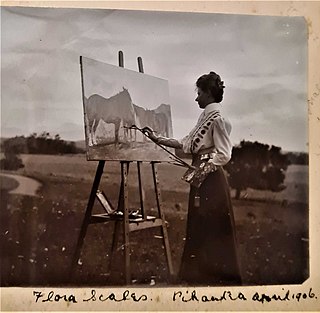Related Research Articles

Rita Angus, known as Rita Cook early in her career, was a New Zealand painter who, alongside Colin McCahon and Toss Woollaston, is regarded as one of the leading figures in twentieth-century New Zealand art. She worked primarily in oil and watercolour, and became known for her portraits and landscapes.

Frances Mary Hodgkins was a New Zealand painter chiefly of landscape, and for a short period was a designer of textiles. Born in Dunedin, she was educated Dunedin School of Art, then became an art teacher, earning money to study in England.
Gretchen Albrecht is a New Zealand painter and sculptor.

Kura Te Waru Rewiri is a New Zealand artist, academic and educator. Art historian Deidre Brown described her as "one of Aotearoa, New Zealand's most celebrated Māori women artists."
May Anne Smith was a New Zealand painter, engraver, textile designer and textile printer. Smith was part of a movement of women who were instrumental in bringing new artistic ideas to New Zealand and influencing the art of the country.

Alice Gwendoline Rhona Haszard (1901–1931) was a New Zealand artist.

Helen Flora Victoria Scales (1887–1985) was a notable New Zealand artist. She was born in Lower Hutt, Wellington, New Zealand in 1887.

Doris More Lusk was a New Zealand painter, potter, art teacher, and university lecturer. In 1990 she was posthumously awarded the Governor General Art Award in recognition of her artistic career and contributions.

Catherine Olivia Orme Spencer Bower was a New Zealand painter. Born in England, she spent her adult life in New Zealand, mostly in Christchurch.
Ian Christopher Scott was a New Zealand painter. His work was significant for pursuing an international scope and vision within a local context previously dominated by regionalist and national concerns. Over the course of his career he consistently sought to push his work towards new possibilities for painting, in the process moving between abstraction and representation, and using controversial themes and approaches, while maintaining a highly personal and recognisable style. His work spans a wide range of concerns including the New Zealand landscape, popular imagery, appropriation and art historical references. Scott's paintings are distinctive for their intensity of colour and light. His approach to painting is aligned with the modernist tradition, responding to the formal standards set by the American painters Morris Louis, Kenneth Noland and Jules Olitski.

Jacqueline Mary Fahey is a New Zealand painter and writer.

Vivian Isabella Lynn was a New Zealand artist.

Emily Karaka, also known as Emare Karaka is a New Zealand artist of Māori descent Her work is recognised for "its expressive intensity, her use of high key colour, and her gritty address of political issues related to Māori land rights and the Treaty of Waitangi".

Suzanne Goldberg (1940–1999) was a New Zealand painter, born in Auckland, New Zealand.
Helen Campbell Brown was a New Zealand artist. Works by Brown are included in the Museum of New Zealand Te Papa Tongarewa.

Helen Stewart was a New Zealand artist.
Elise Constance Mourant was a New Zealand artist. Works by Mourant are held in the collection of the Museum of New Zealand Te Papa Tongarewa.
Elizabeth Wallwork was a New Zealand artist.
Philippa Blair is a New Zealand artist. Her works are held in the collection of the Auckland Art Gallery Toi o Tāmaki, Museum of New Zealand Te Papa Tongarewa and the University of Auckland art collection.

Cass is an oil painting created by the New Zealand artist Rita Angus in 1936, depicting the railway station at the small mountain settlement of Cass in the Canterbury high country. It has been described as "one of the defining works of the 1930s and indeed of New Zealand art history," and was voted "New Zealand's greatest painting" in a 2006 television poll.
References
- 1 2 Museum of New Zealand Te Papa Tongarewa (2005). Treasures from the Museum of New Zealand Te Papa Tongarewa. Te Papa Press. p. 60. ISBN 1-877385-12-3.
- 1 2 3 Kirker, Anne. New Zealand Women Artists Reed Methuen, 1986
- ↑ Brown, Gordon and Keith, Hamish. An Introduction to New Zealand Painting 1839-1980 Collins, 1982
- ↑ Pound, Francis. The Invention of New Zealand Art: Art and National Identity, 1930 - 1970 Auckland University Press, 2009
- ↑ Brown, Gordon New Zealand Painting, 1920-1940 Queen Elizabeth II Arts Council of New Zealand, 1975
- ↑ "1927 - key events - The 1920s | NZHistory, New Zealand history online". nzhistory.govt.nz. Retrieved 29 May 2021.
- ↑ Johnstone, Christopher. Landscape Paintings of New Zealand: A Journey from North to South Random House New Zealand, 2006
- ↑ Births Deaths and Marriages Online accessed 26 November 2018